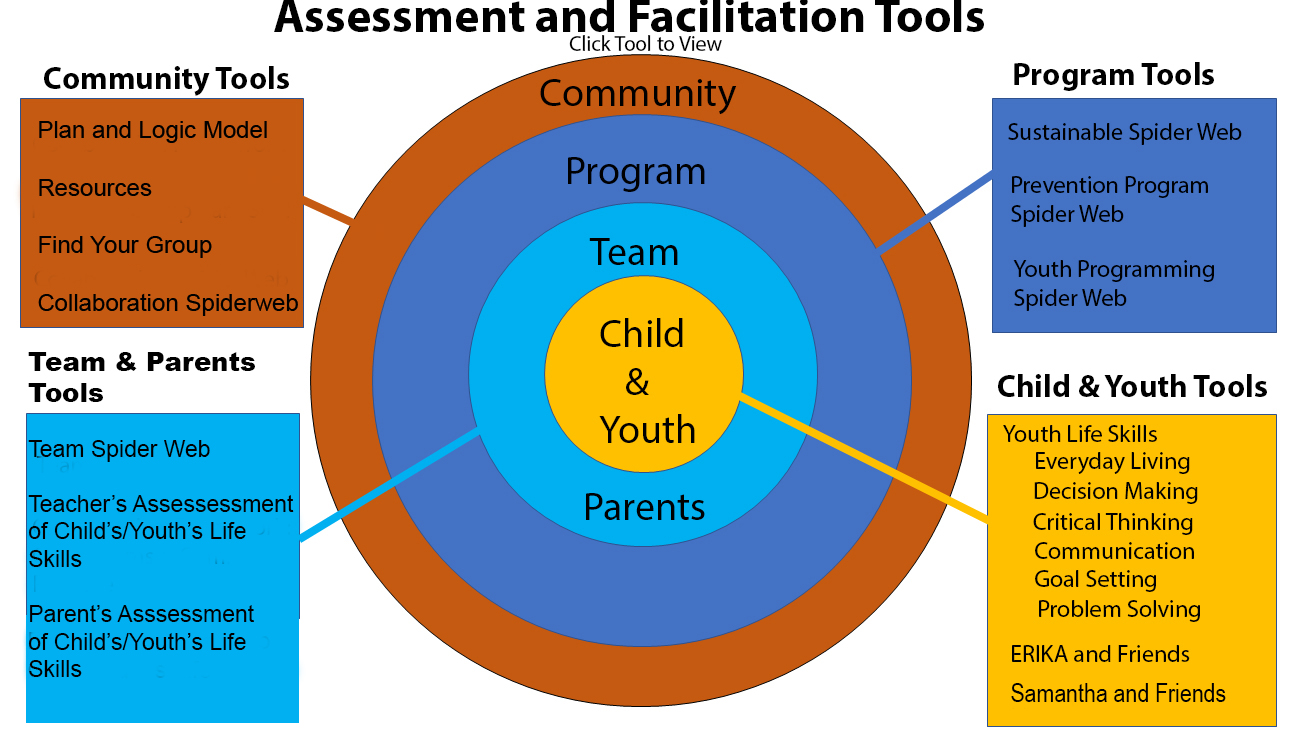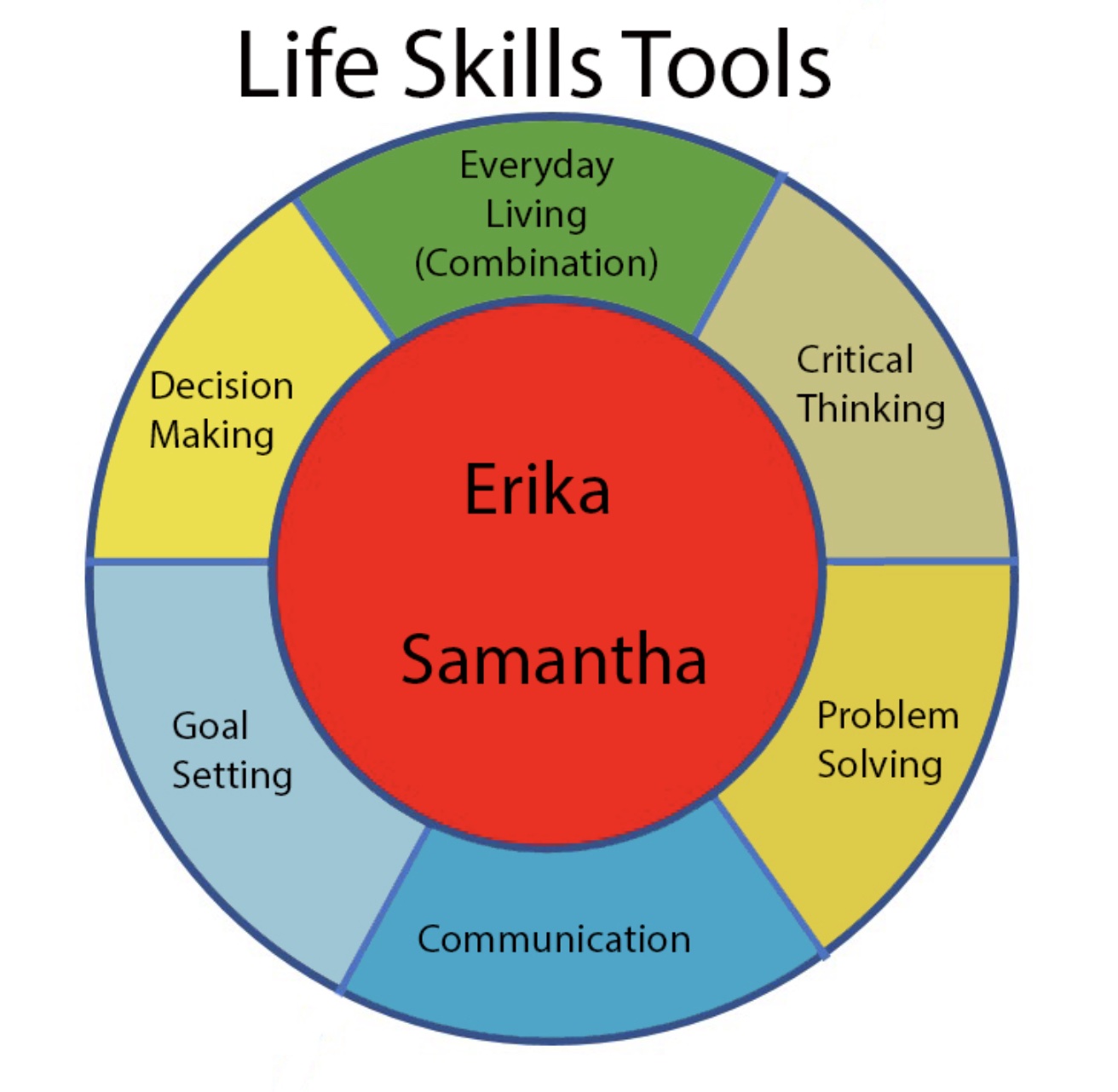

|
| Log-in | Assessment and Facilitation Resources | Youth Resources | Parent Resources | Contact Us |
Introduction |
| Since 1994, Human Service Research, Inc. (HSR) has partnered with state and federal governments, universities, extension programs, and non-profits in building tools to help strengthen communities, programs, teams, and individuals improve the lives of children and youth. Through this process several assessment and facilitation tools were developed. These tools were designed to ask questions that collect information to help facilitate conversations and track changes at many levels that range from vision and purpose to individual changes of children and youth on life skills. Regardless of the level or levels focused on it can be tailored specifically for the user's needs. Assessment and Facilitation tools consist of ecomaps, card sorts, and spiderwebs to collect information on critical areas (see Resources) while the Youth Life Skills tools consist of interactive tools and surveys on decision making, critical thinking, and more. Assessment/Facilitation Tools and Youth Life Skills are available to organizations, professionals, teachers, parents, and others wanting to use it for collaboration, sustainability, programming, team building, teaching, parenting, and developing life skills in children and youth. |
 |  |
The on-line Youth Life Skills can be accessed either through the Assessment and Facilitation Tools or the Youth Life Skills Too or a simplified version in Family Life Skills Talk. HSR developed one of the first on-line interactive programs for children (ERIKA) and youth (SAMANTHA) assessing life skills using cartoon characters, audio, and scenarios focusing on decision making, critical thinking, caring, personal values and social conscience. In addition, questionnaires (the outer ring of Life Skills Tools) are available that address sub-areas of the life skill areas (see Youth Resources for questions and sub-areas). One of the first questions is to decide what tool is best for your purpose and your audience. Looking at the Overview and Parent for Samanthan videos below is a good place to start. Professionals we suggest you use your goals and/or lesson plans and activities as a starting point for assessing best fit and look at our Life Skills evaluation in the Journal of Extension article called The Effects of Age, Gender, and 4-H Involvement on Life Skill Development, especially Table 3. Total Life Skills Mean Change Score by Project Areas (shown below where results found change varied by the type of programming and lesson plans and, possibly, context). |
 |
Parents wanting to look at life skills of their children may just want to run through the demonstration with their child using the links below and talk to them about it as they run through it. These demonstration pages of ERIKA and SAMANTHA do not collect data. Parents can also print off the tool in Resources, have the child fill out the survey, and then discuss with them what they were thinking. Parents may even want to relate to the questions and think how they would have responded at the age of their child. If parents do want to track for what ever purpose like track over time, just register with HSR for the free site Family Life Skills Talk by clicking here to Register. The Family Life Skills Talk is a simplified version of the life skills for parents to use the tools to get information for discussion-something to talk about with their child. The family level login accessed through the login link above will consist of custom screens and reports specific to what the parent/family wants (i.e. one child or more; the tools you want to use that can vary for each child and used multiple times to track change or specific contexts; parents may set up a particular tool around an acitivty/project such as sports, camp, music, and more to give a context for discussion; and parents and grandparents may complete their own assessment of the child to contribute to the discusssion). Discussion with the child is key to the effectiveness of these tools at the family level where it will help interaction and exploration, and possibly, strengthen understanding around decision making, critical thinking, communication, goal setting, and problem solving. Hopefully it encourages the development and use of life skills in our daily lives from young to old. |

|

|
Logging-in and Registration for Facilitation and Assessment Tools |
A Log-in is required to use the Assessment and Facilitation Tools system in order to protect your information. Data and reports are specific to each log-in. People may choose to use paper forms that may be created from the survey questions in Resources. If you do, please cite Human Service Research, Inc. as source for reports, publications, or proposals. At this time this site is free as long as funds allow. Customization is available at a cost. The main purpose of the registration is to set up a username and password that will help protect your data (keeping it confidential) and give you the ability to monitor and analyze your own data. We will require a contact person, email address, and information about your program/project/purpose. HSR will protect your data and only use it for research purposes to better understand the tools and possibly improve them in the future. HSR has collected information since 1994 from runaway and homeless youth, pregnant and parenting teens, homeless youth, juvenile deliquents, afterschool youth, 4-H, and more where HSR has always protected the information. If you have questions or concerns, please contact us and we will be happy to discuss. If you are interested please click here to Register. |
Contact Us |
| For assistance in using the website, the tools, or results contact Dr. Bruce E. Haas, President of Human Service Research, Inc. (HSR) by clicking here. |
Accessibilty and Human Service Research, Inc. |
| HSR is committed to inclusion and attempting to make the tools as accessible as possible. Feel free to contact us to discuss how we can improve inclusion and accessibility. |